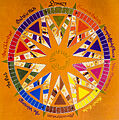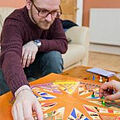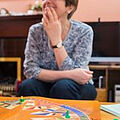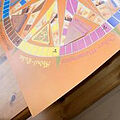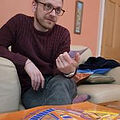Spiritual Pursuit
-
Spiritual Pursuit game (click for close-up)
Spiritual Pursuit is a Bahá’í quiz game, played on a board. It was created in 1997 by the Warwick Bahá'i Bookshop, in Southam, Warwickshire, England, and sold out by 2022. Players pursue one another round the board by answering questions on spiritual topics. The board is divided into ten sections, on subjects such as Bahá’u’lláh, The Writings, Administration and Other Messengers. Each player has to collect six points to complete a section, which is accomplished by answering questions. The main learning takes place by listening to other people's answers, and through ensuing discussion.
The questions are on three levels. The "Regular" questions have the option of multiple choice, making it easier for children, new Bahá’ís or their friends to participate. There are also "Harder" questions to challenge the experts! The second (2008) edition was an improvement because the "Bonus" questions had also been made multiple choice. There are also mechanisms built into the game to ensure that people do not get stuck on one section. The game can be played by individuals or teams or a combination of both. Play can be varied to suit virtually any circumstances or group of people, in order to give everyone a fair chance. This is done through varying the points awarded to certain players, stipulating that natural bookworms always have the "Harder" questions, etc. Various such options are included in the rule booklet. There are even "jokers" which can be handed out, so that players can avoid being challenged by questions on subject areas in which they feel weak. It is important to understand that everyone learns by listening to the questions offered to the other players, by listening to discussion and to answers.
A significant feature of the game is that children can readily be included in the play. This is partly because children can be part of a team, partly because the Regular and Bonus questions offer possible answers, and partly because children can be involved in rolling the die, moving the playing pieces or even reading out the questions. In 2015, a simple set of "Starter" questions was also added for this purpose, see Further_Developments, below.
Because of the printing costs involved with relatively small print runs, and because of the large numbers of playing pieces of various types, the production cost of the game was higher than many Bahá'ís seemed to expect. As playing the game is a community activity, groups of junior youth, groups of university students or local Bahá'í communities often purchased the game collectively.
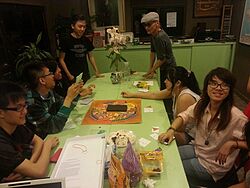
The Questions[edit]
When the game was first envisaged, the creators looked at what sort of things a Bahá’í ought to know. This would encompass something of the history of the Faith and its administration, but also some familiarity with the Writings, the calendar, etc. Accordingly, questions were created for the following ten sections: The Báb, Bahá'u'lláh, Abdu'l-Bahá, Famous Bahá’ís, Administration, The Writings, Prayers, the Calendar, Temples and Holy Places, and Other Messengers. "Regular" and "Harder" questions were devised for each section. In the second edition, the "Regular" questions also have optional "multiple choice" answers.
There would still be other things a Bahá’í should know, or would find of interest, so five "Bonus" categories were devised: Facts and Figures, Peace and Unity, This and That, Hidden Words, and Pot Luck. In the second edition, these categories also have optional "multiple choice" answers.
The result is that an enormous amount of territory is covered during a game!
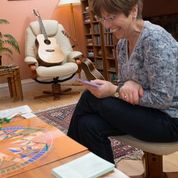
Further Developments[edit]
The number of copies of the game sold exceeds 1000, which represented the entire first and second print run. Enquiries as to availability are still being received by the publishers.
In July, 2014, the Universal House of Justice announced further implementation of the Badi calendar[1]. This affected a tiny handful of questions and answers. A sheet of updates can be obtained from the Bookshop. These updates are also available as downloads from the Warwick Bahá’í Bookshop website.
A small number of questions or answers have been queried, and on the same website a page exists which suggests replacements or rewording for these few questions.
In January, 2015 a new set of question cards, known as "Starter" cards, was produced. These were designed to enable children of perhaps six to twelve years to play the game by themselves. Two answers only were offered for each question, and it is frequently obvious which one is false. A simpler set of rules accompanied this set. These questions can also be used by children or Friends of the Faith during a full game.
Details of Play[edit]
-
The game can be played as a game for individuals or teams
-
The game being played in Belize, Central America (click for close-up)
-
A close-up of the board
-
Tackling one of the "Harder" cards!
-
The cat felt it was missing out on the fun!
-
People enjoying the game
Between two and nine people or teams can play [2]. The first player to complete a circuit of the board, having collected all 10 different triangles (representing the 10 sections of the board), is the winner. If the game is stopped before the end, the person with the most triangles is the winner. Movement around the board is anti-clockwise around the outside ring and is determined by the roll of a die. Ideally each player should start on a different section. Each player selects a post (of any colour) and places it at the start of the section. A player collects points by answering questions correctly. When enough points have been gained to obtain a triangle for a section, the player can move on to the next section. If, by the end of a section, the player has not gained enough points, he or she must make a detour round the inside loop for that section and continue trying to answer the questions. This is where the “Bonus” topics, such as “Peace and Unity” and “Hidden Words” are found.
Assessment of the Game Within the Bahá'í Community[edit]
Spiritual Pursuit, like other Bahá'í games, does not constitute a major part of any Bahá'í activity. Its use has largely been confined to use within Bahá'í homes, or at social events such as Holy Day gatherings or picnics. It has sometimes been used by Bahá'í institutions - for example the Maxwell International School purchased several game sets, so that one could be placed in each dormitory. In another example, it was timetabled into a session of the Scottish Summer School in 2013. However, known examples of this are few. The game is best seen as an informal social and deepening activity. Initiatives to replicate the game as an online activity and to have it translated into other languages have never been seen through to completion.
Participants have observed that playing this game leads to discussion of particular points, and therefore to deepening of those present.
External Links[edit]
- Image, rules, updates for questions, testimonies [1]
